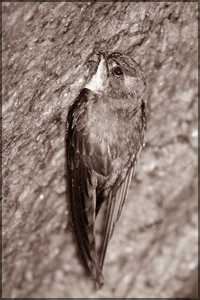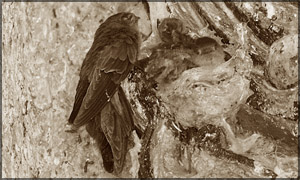Biopiracy - A burning issue
Edible Nest Swiftlet nests confiscated:
by Sajitha PREMATUNGE
[email protected]
Biopiracy - the illicit trade of biological material - is a burning
problem in tropical countries like Sri Lanka. There are two methods of
smuggling biological resources - bio-theft and bio-piracy. bio-theft
refers to a loss in quantity where as bio-piracy results in a
qualitative loss. Fortunately the untiring efforts of Sri Lanka Customs
have prevented the extinction of many species. A shipment of four tons
of Kothala Himbutu was confiscated by Sri Lanka Customs in 1998, 44 kg
of bird nest plant in 1994, shipments of other plant species like Madu
and Sudu Handun and corals have been confiscated many a time.
|

Edible Nest Swiftlet |
|
Smugglers take
maximum advantage of loopholes in regulations. Mostly by false
declarations, misleading terms, cargo brought in a rush for
shipment at air and sea customs points, the much sort after
biological material in variably find their way out of the
country. |
But in spite of all the precautionary measures, some cases may
invariably escape the authorities. Medicinal plants as well as
endangered animal species such as ornamental fish are often smuggled out
of the country every year. Invaluable species like Allamanda cathartica,
Momordica charantia, Binara species (Exacum spp.), cinnamon and
butterflies like Crimson rose are smuggled out of the country. As a
result our country is losing a lot of assets. Smugglers take maximum
advantage of loopholes in regulations. Mostly by false declarations,
misleading terms, cargo brought in a rush for shipment at air and sea
customs points, the much sought after biological material invariably
find their way out of the country.
A shipment of, what is believed to be, nests of Edible Nest Swiftlet
(Colocalia unicolor) was confiscated last week. A wharf clerk attached
to a renowned courier service in Colombo, submitted a mail bag with a
cargo manifest.
The cargo was bound forSingapore. According to the manifest there
were 2.5 kgs of dried fish to Nan Ning Guang, China by a resident in
Kollupitiya. Assistant Superintendents of Customs Dharma Priyantha and
Lukshman Malwita explained that they were dubious, because they didn't
see a point in sending Sri Lankan dried fish to China.
"A courier pack costs around Rs. 7,000 to Rs. 8,000 and it was a
small amount." said Dharma Priyantha. "We were suspicious as to why they
would spend such an amount of money to ship dried fish to an individual
in China."
The production, together with documents were handed over to Mahanama
Sagara, Officer in Charge of the Biodiversity Protection Unit of Sri
Lanka Customs for further investigation. "It was clear that N. M.
Mohamed who handed over the parcel to the courier office, was
absconding." said Mahanama Sagara. "He has said he is at Hambantota and
will appear before Customs as soon as he returns to Colombo. If he
doesn't appear at Customs we will have to obtain an order from the
Magistrate of Colombo to arrest him." says Mahanama Sagara.
 Samantha
Gunasekera, Head of Biodiversity Protection Unit, Department of Customs
remembers previous attempts that were fortunately foiled by the Customs
officials. "Sri Lanka holds the world record for a shipment of 44 kg
Edible nests, which we luckily confiscated. Samantha
Gunasekera, Head of Biodiversity Protection Unit, Department of Customs
remembers previous attempts that were fortunately foiled by the Customs
officials. "Sri Lanka holds the world record for a shipment of 44 kg
Edible nests, which we luckily confiscated.
Another attempt to smuggle around 24 kgs was made four years ago and
around another 24 kgs were confiscated two years ago." Although this may
seem like a small quantity the damage caused is immense. "One kilogramme
may contain as many as 1000 nests, since their nests are the size of
small clay oil lamps." Although harvesting of these nests are illegal
greedy hunters pluck them from the railway tunnels of the hill country
and caves. The soup made from these nests is an expensive delicacy in
restaurants of Far Eastern countries like Singapore, Thailand, Vietnam
and China. Soup made out of using only a very small quantity using these
nests is sometimes sold for 150 Singapore dollars. "The belief that it
acts as an aphrodisiac is a myth. It has no medicinal value. It's just a
mucilaginous substance that contains only proteins." says Professor
Sarath Kotagama.
The birds make their nests with their saliva. They have highly
developed and enlarged salivary glands, which produce and secrete more
saliva during the breeding season. "But this species is at risk because
the harvesting is done before the eggs are laid." explains Samantha
Gunasekera. In some cases the chicks are thrown away since discoloured
nests have to be sold at a cheaper price. However in Indonesia
controlled harvesting of the nests in the wild is done and chimneys are
built in houses to attract birds.
The Edible Nest Swiftlet, with their light bodies, is highly adapted
to flying. Although this particular species is not in the threatened
species list, if this sort of haphazard harvesting continues it may lead
to its extinction. |

